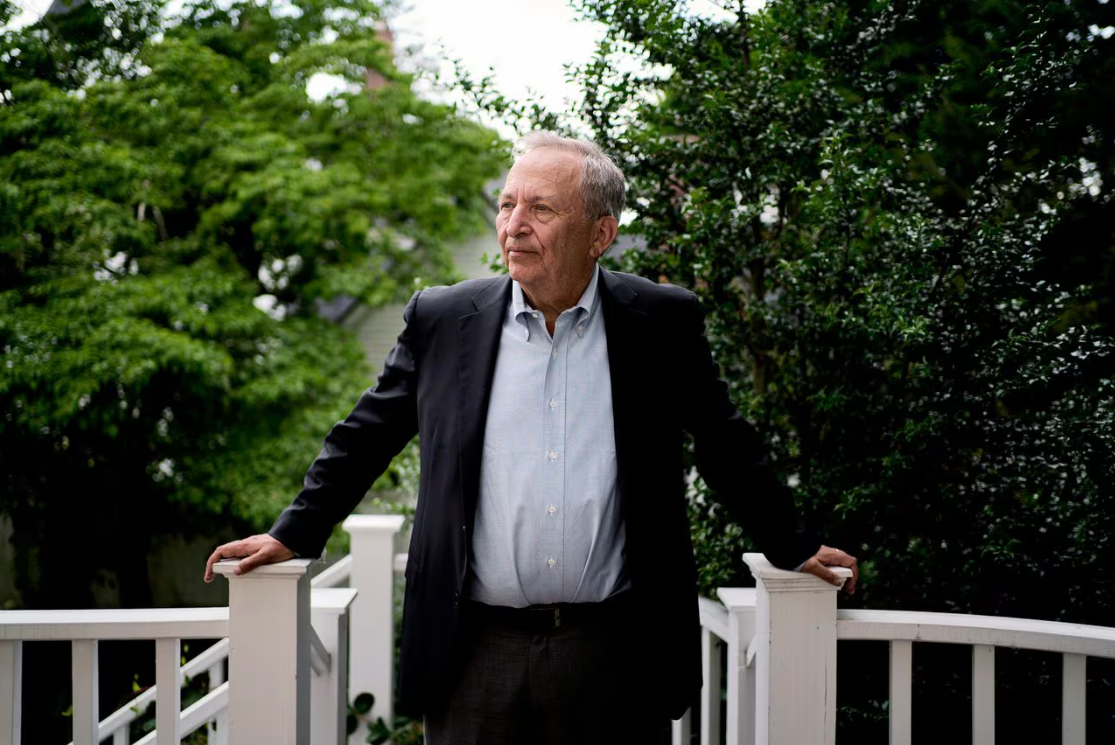拉里·萨默斯被罢免哈佛校长近二十年后 他对于现在哈佛大学的问题有很多话要说

【中美创新时报2024年3月24日波士顿讯】(记者温友平编译)拉里·萨默斯 (Larry Summers) 被罢免校长近二十年后,对于哈佛大学的问题有很多话要说。这位哈佛前校长表示,他有动力遏制日益高涨的反 太主义。但一些同事质疑这是否是个人恩怨在起作用。《波士顿环球报》记者斯蒂芬妮·埃伯特(Stephanie Ebbert)和迪尔德丽·费尔南德斯(Deirdre Fernandes)对此进行了下述详尽报道。
教职员工和大学内部人士在一系列采访中表示,在哈佛和高等教育普遍面临危机的时刻,拉里·萨默斯已成为对两者的主要批评者,私下向同事主动提供建议,并公开抨击那些无视这些建议的人。
一位前大学校长公开削弱他的继任者并谴责他长期的学术家园,这是一种极不寻常的违反礼仪的行为。观察人士指出,讽刺的是,萨默斯在疏远黑人学者并暗示女性在科学和数学方面的能力可能较差后,被迫辞去校长职务,却向大学领导人讲授公共外交。
萨默斯是第一批公开攻击哈佛在2023年 10 月 7 日以色列袭击事件后保持沉默的人之一,他在 X 上发帖称,“在加入@哈佛近 50 年的时间里,我从未像今天这样幻灭和疏远。”
他处于蜂拥而至的批评浪潮的最前线,促使哈佛首位黑人校长克劳丁·盖伊 (Claudine Gay) 一月份辞职。然后,他迅速批评了她选择的继任者,以帮助领导一个反犹太主义特别工作组,并宣称他对哈佛“失去了信心”。
几周前,萨默斯呼应保守派批评家的观点,将高等教育危机部分归咎于对多样性的过分关注。
萨默斯在二月底接受播客“与亚沙·蒙克的精彩战斗”采访时说道:“我们已经远离了功绩和卓越,我们采用了一种特殊的概念和一套社会正义概念作为大学宗旨的中心。”
他的一些批评者想知道是否存在个人愤怒的因素在起作用。正是同样的进步力量帮助盖伊被驱逐出总统职位,但萨默斯认为,根据她作为院长的工作和她的奖学金,盖伊并不是校长的有力候选人。他的观点在大学界广为人知。
“希望拉里的意图不是为了报复,而是为了让哈佛成为一个更好的地方,”莫尔豪斯学院院长戴维·托马斯 (David A. Thomas) 说,他在萨默斯担任哈佛商学院校长期间曾担任哈佛商学院的教授和管理人员。 “从长远来看,他处理这件事的方式是无效的,正是因为这看起来像是他报复自己的感觉的时刻,因为他因为确实与女性和黑人社区存在问题而没有受到很好的对待。”
在哈佛大学,萨默斯的一些同事表示,他们对他的公开攻击感到震惊。
“为什么有人在哈佛度过了整个成年生活并有幸成为哈佛校长…… 他会像最近几个月那样尝试把破坏球带到哈佛,这让我无法想象。” 哈佛大学政府教授史蒂文·莱维茨基(Steven Levitsky)表示,他对萨默斯最近对哈佛的评论提出了直言不讳的批评。
在接受《波士顿环球报》采访时,萨默斯否认了他正在为自己的下台报仇的感觉。
“我早已继续前进,”他说。“多年来,我的重点一直放在我的教学、我的研究以及我对经济政策的贡献上,而不是大学的内部事务,”他补充道。
萨默斯表示,他提出了“重要的良心问题”,而社区中的其他人“一直不敢谈论这些问题”。
萨默斯说,他主要和持久的担忧是校园里的反犹太主义。在哈马斯袭击以色列之后——数十个哈佛大学学生团体发表声明,似乎为袭击辩护并与巴勒斯坦人站在一起——萨默斯指责哈佛大学采取“双重标准”,积极采取行动防止对某些群体的歧视,但未能保护他们犹太人。
犹太人萨默斯说,大学需要“采取更多措施来应对反犹太主义,就像应对其他形式的偏见一样”。
大学官员承认反犹太主义是哈佛大学日益严重的问题,但萨默斯希望采取更果断的行动。今年二月,当亲巴勒斯坦的学生、教职员工团体在社交媒体上发布反犹太主义漫画时,萨默斯赞扬临时校长艾伦·加伯(Alan Garber)谴责该漫画。但与此同时,在一条由 10 部分组成的推文中,他挑衅性地质疑,“支持”这些职位的教职人员如何“被允许保留对犹太学生行使权力的职位?”
当加伯在一月份任命反犹太主义特别工作组作为他解决校园紧张局势和担忧的努力的一部分时,萨默斯与其他批评者一起攻击了任命,其中包括反诽谤联盟首席执行官乔纳森·格林布拉特(Jonathan Greenblatt)和巨额捐助者比尔·阿克曼(Bill Ackman)。著名犹太学者德里克·彭斯拉 (Derek Penslar) 担任该小组的联合主席。萨默斯表示,他“将哈佛大学的反犹太主义问题最小化”,并“将以色列称为种族隔离国家”。彭斯拉拒绝对此事发表评论,但在数百名犹太领袖和学者公开担保他的资历后,他仍然留任。
从萨默斯的角度来看,大学校园中多样性、公平和包容性的支持者认为世界分为“被压迫者”和“压迫者”,并认为以色列压迫巴勒斯坦人,他们应该为人们对犹太国家日益增长的反感负责。
许多犹太校友和学生表示,当他们感到自己被大学管理层忽视时,像萨默斯这样有地位的人愿意发声并充当盟友,他们对此表示赞赏。
哈佛犹太校友联盟的发言人罗尼·布伦(Roni Brunn)说:“他抓住了时机。”该联盟一直在游说管理者根除校园内的反犹太主义,并正在进行全校范围内的审计,以确定课程设置反以色列和反犹太情绪的根源。布伦说,2月初,萨默斯通过 Zoom 向联盟的 350 名成员讲述了他的犹太身份以及哈佛大学如何对抗反犹太主义。
“他给了我们焦点,给了我们希望,”布伦说,“我们想要的是完全正常的。”
哈佛大学政府及非洲和非裔美国人研究教授詹妮弗·霍克希尔德 (Jennifer Hochschild) 表示,她很欣赏萨默斯在 10 月 7 日之后在社交媒体上最初批评哈佛大学的帖子,尽管她承认这违反了规定。
“大学前校长批评大学现任校长并不是英国人的好作风。一个人不会做那种事。拉里也做到了,”她说。“但他这样做的原因是因为他的热情和道德承诺。”
然而,一些为巴勒斯坦权利发声的学生发现萨默斯的倡导有问题。
哈佛大学 19 岁的二年级学生维奥莱特·巴伦 (Violet Barron) 称萨默斯公开谴责为巴勒斯坦人发声的学生团体“是一种不对称的权力利用,这感觉是错误的”。
虽然巴伦称反犹太主义在全国范围内增长是“不可否认的事实”,但她表示,萨默斯和其他人夸大了哈佛大学的威胁,因为很多人将反犹太复国主义与反犹太主义混为一谈。10 月 7 日后,她是哈佛大学成立“犹太人支持巴勒斯坦”组织的人之一,目的是“纠正那些被夸大的说法”。
去年秋天,萨默斯确实公开反对对亲巴勒斯坦学生的人肉搜索,这些学生在袭击后签署了一封有争议的信件。他在推特上写道:“现在是一个绝对明确的时刻,威胁我们社区其他人安全的言论或行为是不会被容忍的。”但他仍然坚持认为,校园里的反犹太主义如果有的话,那就是被低估了。
萨默斯被认为是一位杰出的经济学家,也是克林顿和奥巴马政府的高级经济顾问、银行家、对冲基金经理以及最近的人工智能先驱都向他寻求指导,萨默斯从不羞于发表自己的观点,无论是在公开场合还是在幕后,无论是在哈佛大学还是他参与的其他组织。
萨默斯的朋友贾森·弗曼(Jason Furman)和萨默斯一样,都曾担任国家高级经济顾问,并在哈佛大学经济系和肯尼迪政府学院任教。他说,萨默斯“非常关心”,并且“认为他通过说出自己的想法让事情变得更好”。
弗曼在担任经济顾问委员会主席时亲身经历了萨默斯的直率批评,并定期向他约 300 人的电子邮件列表发送更新。
“拉里会回信说:‘这是你做错的 10 件事,你应该考虑的三件事,以及你应该提出但没有提出的两点,’”弗曼说。
萨默斯今年晚些时候将满 70 岁,他以极其肯定地表达自己的想法而闻名。他并不总是对的。
20 世纪 90 年代,萨默斯在财政部任职期间,坚决反对监管复杂的金融衍生品,许多人指责这导致了 2008 年的经济危机。最近,作为一名经济评论员,他对拜登总统的新冠刺激计划将加速通胀的预测被证明是正确的。但他错误地预测美联储为控制通胀而大幅加息将导致经济衰退和失业率飙升。
如今,萨默斯秋季仍然在哈佛大学教授三门课程,他的时间分布在剑桥和亚利桑那州,他的妻子(也是一名学者)在亚利桑那州经营着一个中心。他淡化了自己作为名誉校长和国家人物的地位,暗示他像任何教授一样插入了他对哈佛的看法。
“我不认为很多人听我的意见构成了我不应该被允许表达意见的理由,”他说。
萨默斯承认,他已经在幕后给哈佛大学有影响力的人士打电话,让他们知道他正在关注他们对校园骚乱的反应,并且他准备公开谈论此事。
哈佛大学历史学教授艾莉森·弗兰克·约翰逊 (Alison Frank Johnson) 表示,自 2005 年以来,她在校园里任教,教职员工和管理人员感到自己受到萨默斯欺负的故事比比皆是。她说,近几个月来,心灰意冷的哈佛大学教职人员甚至恳求加伯进行干预,要求萨默斯收回自己的公开批评言论。然而,加伯强调萨默斯有说出自己想说的话的自由,她补充说。
“他在欺凌行为中使用的一个工具是公开羞辱的威胁,”弗兰克·约翰逊说。
萨默斯驳斥了这些私人谈话相当于扼杀言论自由或威胁和欺凌同事的说法。事实上,萨默斯说,他认为提前通知批评对象是“基本礼貌”。
“我不相信追捕别人,”萨默斯说。“但学术自由并不包括免受批评的自由。当我要批评观点时,我总是尽力提前通知人们我将这样做。”
不过,他承认,在社交媒体上批评纽约市哥伦比亚大学现代阿拉伯研究教授拉希德·卡里迪(Rashid Khalidi)之前,他并没有提醒他。萨默斯在 1 月下旬在 X 上发表的帖子获得了 280 万次浏览,他批评哈佛大学两次邀请“许多人认为他是反犹太主义者”的卡里迪在校园演讲。萨默斯后来在推特上表示,将卡里迪与反犹太主义联系起来是错误的,他亲自联系了卡里迪。
当被问及这次交流时,卡里迪说:“我对拉里·萨默斯没什么可说的。”
明尼苏达州马卡莱斯特学院前院长、哈佛大学研究生教育学院客座教授布莱恩·罗森伯格(Brian Rosenberg)表示,萨默斯最近的批评评论可能增强了他作为有影响力的内部人士的形象。
但这对哈佛的学生有帮助吗?罗森伯格说,可能不会。
“我的建议是保持安静,”罗森伯格说。“但我确信他不会接受这个建议。”
题图:哈佛大学前校长兼财政部长拉里·萨默斯 (Larry Summers) 在布鲁克莱恩的家中。DAVID DEGNER/NYT
附原英文报道:
Larry Summers was ousted as Harvard president. He has a lot to say about what’s wrong with the university now.
The school’s former president says he is motivated to curb rising antisemitism. Some colleagues question if personal pique is at play.
By Stephanie Ebbert and Deirdre Fernandes Globe Staff,Updated March 21, 2024
Nearly two decades after he was ousted as president, Larry Summers has a lot to say about what’s wrong with Harvard University.
At a moment of crisis for Harvard and higher education generally, he has emerged as a leading critic of both, privately offering his colleagues unsolicited advice, faculty and university insiders said in a series of interviews, and publicly blasting those who disregard it.
It is a highly unusual breach of protocol for a former college president to openly undercut his successors and denounce his longtime academic home. And observers note the irony of Summers lecturing university leaders on public diplomacy while he was forced to step down as president after alienating Black scholars and suggesting women may have lesser aptitude for science and math.
Summers was among the first to publicly attack Harvard for its silence after the Oct. 7 attacks on Israel, posting on X, “In nearly 50 years of @Harvard affiliation, I have never been as disillusioned and alienated as I am today.”
He was at the forefront of a stampede of criticism that prompted Harvard’s first Black president, Claudine Gay, to resign in January. Then, he swiftly panned her successor’s pick to help lead a task force on antisemitism, declaring he had “lost confidence” in Harvard.
A few weeks ago, echoing the arguments of conservative critics, Summers blamed the crisis in higher education on, in part, a preoccupation with diversity.
“We have stepped away from merit and excellence, and we have adopted a particular concept and set of concepts of social justice as being at the center of the purpose of universities,” Summers said in an interview on the podcast “The Good Fight with Yascha Mounk,” in late February.
Some of his critics wonder if there’s an element of personal pique at play. The same progressive forces that helped expel him from the presidency elevated Gay, whom Summers thought was not a strong candidate for president, based on her work as dean and on her scholarship. His views were well-known in the university community.
“Hopefully, Larry’s intentions are not about revenge but about making Harvard a better place,” said David A. Thomas, president of Morehouse College, who was a professor and administrator at Harvard Business School during Summers’ tenure as university president. “The way he’s going about it in the long term is ineffective, precisely because it looks like it’s sort of a moment for him to avenge his sense that he was somehow not treated well because he did have issues with women and the Black community.”
At Harvard, some of Summers’ colleagues say they’re shocked by his open attacks.
“Why somebody who spent his entire adult life at Harvard and had the honor of being president of Harvard . . . would try and take a wrecking ball to Harvard the way he has in recent months is beyond me,” said Steven Levitsky, a government professor at Harvard and a vocal critic of Summers’ recent commentary on Harvard.
In an interview with the Globe, Summers dismissed the sense that he is avenging his ouster.
“I have long since moved on,” he said. “My focus for many years now has been on my teaching, my research, and my contributions to economic policy, not on the internal affairs of the university,” he added.
Summers said he is raising up “important issues of conscience,” which others in the community “have been afraid to speak out on.”
His primary and abiding concern, Summers said, is antisemitism on campus. After Hamas attacked Israel — and dozens of Harvard student groups issued a statement that appeared to justify the attacks and aligned themselves with Palestinians — Summers called out Harvard for “a double standard” of reacting zealously to prevent discrimination against some groups, but failing to protect Jews.
The university needs “to do much more to respond to antisemitism,” said Summers, who is Jewish, “in ways that are parallel with other forms of prejudice.”
University officials have acknowledged antisemitism is a growing problem at Harvard, but Summers wants more decisive action. In February, when an antisemitic cartoon was posted on social media by pro-Palestinian groups of students, faculty, and staff, Summers praised interim president Alan Garber for condemning that cartoon. But at the same time, in a 10-part tweet thread, he provocatively questioned how faculty “party to” the posts could “be permitted to remain in positions where they exercise authority over Jewish students?”
When Garber appointed the task force on antisemitism in January as part of his efforts to address tensions and concerns on campus, Summers joined other critics, including Jonathan Greenblatt, chief executive of the Anti-Defamation League and megadonor Bill Ackman, in attacking the appointment of Derek Penslar, a leading Jewish scholar, as cochair the group. Summers said he had “minimized Harvard’s anti-Semitism problem” and “referred to Israel as an apartheid state.” Penslar declined to comment for this story, but he has remained in the role after hundreds of Jewish leaders and scholars publicly vouched for his credentials.
From Summers’ perspective, the proponents of diversity, equity, and inclusion on college campuses who see the world as divided between the “oppressed” and “oppressors” — and view Israel as oppressing Palestinians — are to blame for growing antipathy toward the Jewish state.
Many Jewish alumni and students said they appreciate that someone of Summers’ stature is willing to speak out and serve as an ally, when they have felt ignored by the university’s administration.
“He gets the moment,” said Roni Brunn, a spokesperson for Harvard Jewish Alumni Alliance, which has been lobbying administrators to root out antisemitism on campus and is conducting a university-wide audit identifying sources of anti-Israel and anti-Jewish sentiment in course offerings. In early February, Summers spoke via Zoom to 350 members of the alliance about his Jewish identity and how Harvard can fight antisemitism, Brunn said.
“He has given us focus and given us hope,” Brunn said, “that what we want is completely normal.”
Jennifer Hochschild, a Harvard professor of government and African and African American studies, said she appreciated Summers’ initial social media post criticizing Harvard after Oct. 7 even though she acknowledged it broke protocol.
“It’s not good British form for the former president of the university to criticize the current president of the university. One doesn’t do that sort of thing. And Larry does,” she said. “But the reason he’s doing this is because of his passion and moral commitment.”
Some students who speak up for Palestinian rights, however, have found Summers’ advocacy problematic.
Violet Barron, a 19-year-old sophomore at Harvard College, called Summers’ public condemnation of student groups that speak up for Palestinians “an asymmetric leveraging of power, and that feels wrong.”
While Barron called it an “undeniable fact” antisemitism is growing nationally, she said the threat at Harvard has been overstated by Summers and others because so many conflate anti-Zionism with antisemitism. She was among those who founded the group Jews for Palestine at Harvard after Oct. 7 to “correct the narrative that had been so blown out of proportion.”
Summers did speak out last fall against the doxxing of pro-Palestinian students who signed a controversial letter following the attacks. “It is a time for absolute clarity that words or deeds that threaten the safety of others in our community will not be tolerated,” he tweeted. But he remains adamant the antisemitism on campus is, if anything, underestimated.
Known as a brilliant economist and a top economic adviser to the Clinton and Obama administrations whose guidance has been sought out by bankers, hedge fund managers, and more recently artificial intelligence pioneers, Summers has never been shy about offering his opinion, whether publicly or behind the scenes, at Harvard and other organizations with which he’s involved.
Jason Furman, a friend who, like Summers, worked as a top national economic adviser and teaches in both Harvard’s economics department and the Kennedy School of Government, said Summers “just cares enormously,” and “thinks he makes things better by speaking his mind.”
Furman experienced Summers’ unvarnished critiques himself when he was the chairman of the Council of Economic Advisers, and sent regular updates to his email list of some 300 people.
“Larry would write back: ‘Here are 10 things you did wrong, three things you should think about, and two points you should have made but didn’t,’” Furman said.
Summers, who will turn 70 later this year, is famous for presenting his ideas with boundless certitude. He is not always right.
In the 1990s, while Summers was at the Treasury Department, he adamantly fought efforts to regulate complex financial derivatives, which many blamed for contributing to the 2008 economic crisis. More recently, as an economic commentator, he proved correct in foreseeing that President Biden’s COVID stimulus package would accelerate inflation. But he incorrectly predicted the aggressive interest rate increases by the Federal Reserve to bring inflation under control would lead to a recession and spike in unemployment.
These days, Summers still teaches three classes at Harvard in the fall and divides his time between Cambridge and Arizona, where his wife, also an academic, runs a center. He downplayed his stature as a president emeritus and national figure, suggesting he’s interjecting his ideas about Harvard as any professor might.
“I do not feel that the fact that many people listen to me constitutes a reason why I should not be allowed to express opinions,” he said.
Summers acknowledged he has made behind-the-scenes calls to influential players at Harvard, letting them know he was following their response to the turmoil on campus, and that he was prepared to publicly speak out about it.
Alison Frank Johnson, a Harvard history professor, said stories of faculty and administrators feeling bullied by Summers abound on campus, where she has taught since 2005. Frustrated Harvard faculty have in recent months even pleaded with Garber to intervene and ask Summers to dial back his public take-downs, she said. Garber, however, has stressed Summers has the freedom to say what he wants, she said.
“A tool that he uses in the bullying is the threat of public sort of shaming,” Frank Johnson said.
Summers dismissed the claim those private conversations amount to stifling free speech or threatening and bullying of his colleagues. In fact, Summers said, he views it as “a basic courtesy” to give the targets of his criticism advance notice.
“I don’t believe in going after people,” Summers said. “But academic freedom does not include freedom from criticism. And when I’m going to criticize views, I’ve tried always to give people notice in advance that I was going to do that.”
He acknowledged, however, that he did not alert Rashid Khalidi, a professor of modern Arab studies at Columbia University in New York City, before criticizing him on social media. In a late January post on X that drew 2.8 million views, Summers criticized Harvard for twice inviting Khalidi, “who many see as anti-semitic,” to speak on campus. Summers later tweeted that it was a mistake to link Khalidi to antisemitism, and that he had personally reached out to Khalidi.
Asked about the exchange, Khalidi said: “I have nothing to say about Larry Summers.”
Brian Rosenberg, former president of Macalester College in Minnesota and a visiting professor at the Harvard School of Graduate Education, said Summers’ recent critical commentary may have bolstered his image as an influential insider.
But has it helped students at Harvard? Probably not, Rosenberg said.
“My advice would be to be quiet,” Rosenberg said. “But I’m sure he would not take that advice.”



